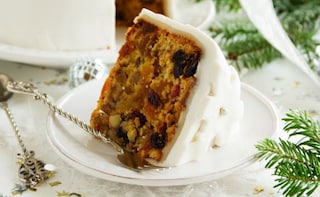Image credit: Istock
(Adapted from "The Bengali Five Spice Chronicles")Prep time: 20 minutes (plus a week to a month for soaking the fruit)
Cook time: 45 minutes
Yield: 10 servingsI shy away from calling this recipe "plum cake." That dark moist fruit cake is a Christmas regular in the multiple cake shops that dot Kolkata. This recipe is close, but something about it falls just a little short of the taste I remember, possibly because nostalgia cannot be bottled and infused in a cake batter to complete the flavors as the mind recalls them.Ingredients
1 cup of large mixed raisins
1/2 cup chopped, candied citrus peel
1/4 cup chopped cherries or cranberries
1/2 cups of rum
2 cups all-purpose white flour
1/4 teaspoon salt
1 1/2 cups (3 sticks) unsalted butter, softened
3/4 cup loosely packed light brown sugar
1/4 cup granulated sugar
1/4 cup robust molasses
4 eggs, well-beaten
1 teaspoon baking powder
3/4 cup milk
1 teaspoon vanilla extract
1/2 cup shredded coconutDirections1. Place all the fruits in a non-reactive bowl. Add the rum and cover and set aside for at least a week, or, for best flavor, for a month.2. Grease an 8-inch to 10-inch loaf pan and pre-heat the oven to 350 F.3. Drain the fruit when you are ready to use and reserve the soaking liquor, if any.4. Sift together the flour and salt. Sprinkle about a ¼ cup of the flour mixture over the drained fruit and toss to coat.5. Cream together the butter, brown sugar, and granulated sugar. Stir in the molasses. Add the beaten eggs to the mixture and beat to combine.6. Add the baking powder to the remaining flour mixture and add to the batter in batches, alternating with the milk, and beat until well combined.7. Beat in the vanilla and almond extracts. Stir in the shredded coconut. Stir in the floured fruit. Pour batter into prepared pan.8. Bake the cake for 40 to 45 minutes until a toothpick inserted into the center comes out clean. Cool slightly.9. Invert the cake onto a plate and pour the reserved soaking liquor over it. Allow it to sit to absorb the liquor. This cake can be served warm or alternately wrapped and stored and served when needed.
Advertisement
Advertisement
Advertisement
Advertisement
(Adapted from "The Bengali Five Spice Chronicles")Prep time: 20 minutes (plus a week to a month for soaking the fruit)
Cook time: 45 minutes
Yield: 10 servingsI shy away from calling this recipe "plum cake." That dark moist fruit cake is a Christmas regular in the multiple cake shops that dot Kolkata. This recipe is close, but something about it falls just a little short of the taste I remember, possibly because nostalgia cannot be bottled and infused in a cake batter to complete the flavors as the mind recalls them.Ingredients
1 cup of large mixed raisins
1/2 cup chopped, candied citrus peel
1/4 cup chopped cherries or cranberries
1/2 cups of rum
2 cups all-purpose white flour
1/4 teaspoon salt
1 1/2 cups (3 sticks) unsalted butter, softened
3/4 cup loosely packed light brown sugar
1/4 cup granulated sugar
1/4 cup robust molasses
4 eggs, well-beaten
1 teaspoon baking powder
3/4 cup milk
1 teaspoon vanilla extract
1/2 cup shredded coconutDirections1. Place all the fruits in a non-reactive bowl. Add the rum and cover and set aside for at least a week, or, for best flavor, for a month.2. Grease an 8-inch to 10-inch loaf pan and pre-heat the oven to 350 F.3. Drain the fruit when you are ready to use and reserve the soaking liquor, if any.4. Sift together the flour and salt. Sprinkle about a ¼ cup of the flour mixture over the drained fruit and toss to coat.5. Cream together the butter, brown sugar, and granulated sugar. Stir in the molasses. Add the beaten eggs to the mixture and beat to combine.6. Add the baking powder to the remaining flour mixture and add to the batter in batches, alternating with the milk, and beat until well combined.7. Beat in the vanilla and almond extracts. Stir in the shredded coconut. Stir in the floured fruit. Pour batter into prepared pan.8. Bake the cake for 40 to 45 minutes until a toothpick inserted into the center comes out clean. Cool slightly.9. Invert the cake onto a plate and pour the reserved soaking liquor over it. Allow it to sit to absorb the liquor. This cake can be served warm or alternately wrapped and stored and served when needed.
For the latest food news, health tips and recipes, like us on Facebook or follow us on Twitter and YouTube.
Advertisement
